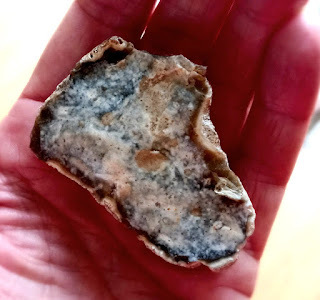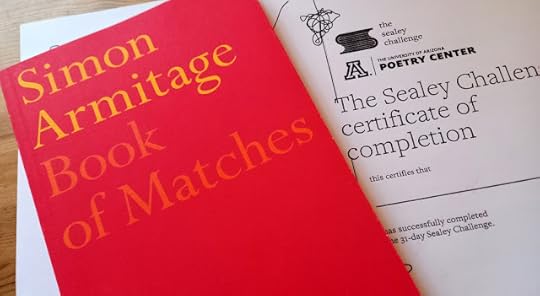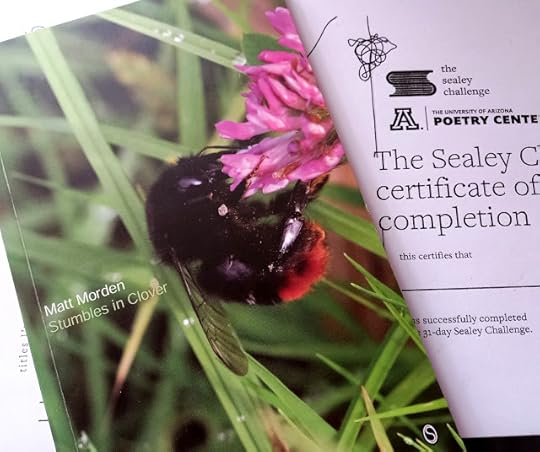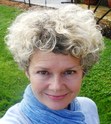Lynne Rees's Blog, page 3
November 17, 2023
Poem ~ Nothing, Not Nothing
I have to brush the finest of airborne cobwebs from my face, again and again, nothing to see
in my gloves, only what I can feel across my cheeks and lips, almost, but not quite, nothing.
Is there a name for the arena that exists between the visible and the invisible, between the detectable
and the undetectable? A place where boundaries have been polished into insignificance?
Is that the place where poetry finds us?Or if not poetry whatever you would like to call it –
a place of wonder or stillness at your centre, connection, quiet epiphany?
I imagine the spiderlings climbing grass stalks, fence posts, pointing their abdomens into the air and releasing
their silk and when the thread is long enough how the wind catches it and the spiderlings
lift into the air like kites on a string of silk.Some days I am running through the marvellous.

Photo courtsesy of Royal Society of Biology
September 6, 2023
Poem

It takes practice to be like this self seeded sunflower - we're not all equipped with an acceptanceof possible failure or prepared for the possibility of standing alone. Can you say thoughthat this wasn't worth it?

August 29, 2023
The Sealey Challenge - Simon Armitage
I had to double check myself re an idea I had about SimonArmitage’s Book of Matches (Faber & Faber 1993). So I Googled, andyes, I had remembered it correctly. The 30 fourteen-line poems/sonnets in thefirst section are each, supposedly, meant to be read in the time it takes for amatch to burn. I guess the clue is in the opening stanza of the first poem:
“My party piece:
I strike, then from the moment when the matchstick
conjures up its light, to when the brightness moves
beyond its means, and dies, I say the story
of my life —”
Well, you just have to, don’t you?! My first match burntout after a few lines and I realised the draft from my writing room door thatopens onto the garden was to blame. My second attempt, different poem, had asecond or two to spare. My third one had me squealing and blowing it out as theflame licked at my fingertips a couple of lines before the end.
But gimmicks apart, I like the poems in this collection.I like Armitage’s command of form and language, of rhythm and rhyme, and hownone of those ever dominate the poems, only contribute to their music. What hehas to say always transcends the engineering work. I feel he understands thatthe audience matters. He’s a poet that cares about his readers. The work can beboth playful and serious. Serious but not solemn.
And if I hadn’t liked the collection of my own accord, Iwould have made myself like it after reading about poet Ruth Padel’sunfavourable review in which she said that praise for the book had come frommainly non-poets. Because that’s brownie points for me. The mainstream poetryworld can be, in my experience, unpleasantly incestuous, with poets so oftenwriting for and reading to other poets. To reach a non-poet audience seems likean admirable achievement.
I lost track of his work as Poet Laureate, maybe becausehis appointment in 2019 was so quickly followed by the Covid years andsubsequent life events that took my full attention. But I want to read more ofhim now. Especially some of the poems mentioned in his Wiki bio: poems aboutthe 1969 moon landing, those commissioned by the Institute of Cancer Researchand the Royal Astronomical Society, about mental health, the Antarctic, the100th anniversary of the burial of the Unknown Warrior, lives lost to Covid, incelebration of national parks and open spaces, the Russian invasion of Ukraine.So many. So diverse.
 I went running with my ladies’ running group yesterdaymorning and as we crossed a field at the foot of the North Downs I picked up apiece of flint, one of thousands that were scattered across the fields mixed inwith the sandy clay.
I went running with my ladies’ running group yesterdaymorning and as we crossed a field at the foot of the North Downs I picked up apiece of flint, one of thousands that were scattered across the fields mixed inwith the sandy clay.So I’ve picked Armitage’s poem, ‘On the Trail of the OldWays’ to share with you, as he mentions flint, and because I had such a strongfeeling of gratitude for the landscape yesterday, how lucky I was to be able torun through it, and partly along The Pilgrim’s Way. A literal trail of the oldways.
(I’ve also added a ‘Matchstick’ poem for you to have funwith fire, if you want to 🔥)


August 27, 2023
The Sealey Challenge - Matt Morden
It’s rare to reada poetry collection and enthuse about every one included in it. Inevitably somepoems will resonate with us more than others. But Matt Morden’s collection, Stumblesin Clover (Snapshot Press 2007) has me savouring every single haiku onevery single page. I felt like that when I first bought it and feel it again today.
Nigel Jenkins, on the back cover, said, ‘They are as spare and translucent asit’s possible to be, yet they are deeply affecting...’. ‘Spare’ could easilysuggest something that has been pared back to the detriment of content andmeaning. But Morden has such a wonderful eye for detail, and humanity observed,that his micro poems expand beyond their physical boundaries. They are like miniaturedoorways into shared emotions, felt experiences. And the natural world, whereit appears, always feels, through suggestion, like a parallel to the human one.Enjoy these few.
~
gathering dusk
my son bowls me out
for the first time
a colleague’s sigh
arrives before he does
monday morning
women’s refuge
sunlight finds the blue
in painted glass
end of the holiday
a square of pale grass
beneath the tent
~
I mentioned in a previous post that, for me, the best poetsand poetry collections are the ones that fire me up to write too. Here are acouple of haiku written today, thanks to Matt Morden.
~
unsettled weather
she deletes her Whatsapp
while I am reading it
summer’s end
he buys me a chilli plant
called ‘Basket of Fire’


The Sealey Challenge
It’s rare to reada poetry collection and enthuse about every one included in it. Inevitably somepoems will resonate with us more than others. But Matt Morden’s collection, Stumblesin Clover (Snapshot Press 2007) has me savouring every single haiku onevery single page. I felt like that when I first bought it and feel it again today.
Nigel Jenkins, on the back cover, said, ‘They are as spare and translucent asit’s possible to be, yet they are deeply affecting...’. ‘Spare’ could easilysuggest something that has been pared back to the detriment of content andmeaning. But Morden has such a wonderful eye for detail, and humanity observed,that his micro poems expand beyond their physical boundaries. They are like miniaturedoorways into shared emotions, felt experiences. And the natural world, whereit appears, always feels, through suggestion, like a parallel to the human one.Enjoy these few.
~
gathering dusk
my son bowls me out
for the first time
a colleague’s sigh
arrives before he does
monday morning
women’s refuge
sunlight finds the blue
in painted glass
end of the holiday
a square of pale grass
beneath the tent
~
I mentioned in a previous post that, for me, the best poetsand poetry collections are the ones that fire me up to write too. Here are acouple of haiku written today, thanks to Matt Morden.
~
unsettled weather
she deletes her Whatsapp
while I am reading it
summer’s end
he buys me a chilli plant
called ‘Basket of Fire’


August 20, 2023
The Sealey Challenge - Linda Pastan

I only bought Linda Pastan’s collection, The Last Uncle (WW Norton & Co 2002), a few months ago. I bought it after reading the title poem on a poetry website. It rang so true as I lost my last two uncles at the end of 2022 and the beginning of this year and one of my cousins had said, ‘We’re the older generation now.’ I wrote about it on here.
Reading through the collection today it’s another poem (‘The Vanity of Names’) that reaches me. It’s about a house staying ‘fixed in its landscape./ Rooms will be swept clean/ of all its memories. Doors will close./ Even the animal graves out back/ will forget who planted the bones/ …’ I am selling the house I was born in, two years after my parents died. In those two years I have spoken to them there and watched grief change shape. I felt less of their absence and more of their eternal presence. I came to be comforted by the home they lived in from the moment it was built in April 1957 until March 2021. But it is still hard letting it go. And that’s going to happen in the next few weeks: my last visit, the last time I open the front door. The last time I step into the room I was born in. The last time I close the door and turn the key. Before handing it to a stranger.
Pastan understands that her house ‘will enter/ the dreams of other people’ but ‘to acquiesce/ is never easy. It is to love the unwritten future/ almost as well as the fading past./ It is to relinquish the vanity of names/ which are already disappearing/ with every cleansing rain …’ Yes. A leap of faith into an unwritten future. And, ‘the cleansing rain’. I can work with those.
The Sealey Challenge

I only bought Linda Pastan’s collection, The Last Uncle (WW Norton & Co 2002), a few months ago. I bought it after reading the title poem on a poetry website. It rang so true as I lost my last two uncles at the end of 2022 and the beginning of this year and one of my cousins had said, ‘We’re the older generation now.’ I wrote about it on here.
Reading through the collection today it’s another poem (‘The Vanity of Names’) that reaches me. It’s about a house staying ‘fixed in its landscape./ Rooms will be swept clean/ of all its memories. Doors will close./ Even the animal graves out back/ will forget who planted the bones/ …’ I am selling the house I was born in, two years after my parents died. In those two years I have spoken to them there and watched grief change shape. I felt less of their absence and more of their eternal presence. I came to be comforted by the home they lived in from the moment it was built in April 1957 until March 2021. But it is still hard letting it go. And that’s going to happen in the next few weeks: my last visit, the last time I open the front door. The last time I step into the room I was born in. The last time I close the door and turn the key. Before handing it to a stranger.
Pastan understands that her house ‘will enter/ the dreams of other people’ but ‘to acquiesce/ is never easy. It is to love the unwritten future/ almost as well as the fading past./ It is to relinquish the vanity of names/ which are already disappearing/ with every cleansing rain …’ Yes. A leap of faith into an unwritten future. And, ‘the cleansing rain’. I can work with those.
August 16, 2023
The Sealey Challenge - Nigel Jenkins

I only knew him for a little over six years but he changed the direction of my life.
After I had some haiku and haibun published in ‘Planet Magazine’ in 2007, Nigel Jenkins invited me to the launch of his haiku writing collection, O for a gun (Planet) that summer in Aberystwyth. I moved back to France in the Spring of 2008 but we kept in touch and he subsequently invited me to edit another country, haiku poetry from Wales (Gomer Press 2011) with him and Ken Jones.
I travelled home from France for the launch of that collection in 2011. I remember walking through Swansea Marina with Nigel and him asking me whether I’d ever thought of writing a ‘Real' Port Talbot. Nigel was the author of Real Swansea I & II and was working on Real Gower, for Seren Books.
‘Oh, I don’t think I could,’ I said.
I didn’t feel as if I had the ability to write prose at length. And the ‘Real’ books were so eclectic too, a collage of historical research, journalism, memoir, sometimes poetry, and photography. And eclectic was exactly what Nigel was: essayist, journalist, creative non-fiction writer, editor, broadcaster, poet, playwright, lecturer.
‘You could,’ he said.
And I decided to believe him. And I did. And he came to the launch of Real Port Talbot at Taibach Rugby Club in November 2013. I didn’t see him again. He died in January 2014 from pancreatic cancer.
I’d written to him after his diagnosis in December:
I am writing from the top of my head because what is in my heart almost weighs too heavily to put down on paper. I want you to stay around for a long time. For Margot and your daughters and close friends. And selfishly for me too. When you like people, and they feel that warmth, it makes a difference to their lives, Nigel. Maybe because they know – I know – that you do not tolerate navel-gazers and clever dicks and pomposity! So we feel saved!
I still miss him. And continually feel grateful for the gift of his words. For his openness and generosity. For the elegiac and the comical, and everything in between.
I open the window —
dogs barking in the nights
of childhood
the seal’s head and mine
bobbing face to face
on the tide

Nigel, at Tre'r Caeri, Lleyn Peninsula, North Wales 2012
The Sealey Challenge

I only knew him for a little over six years but he changed the direction of my life.
After I had some haiku and haibun published in ‘Planet Magazine’ in 2007, Nigel Jenkins invited me to the launch of his haiku writing collection, O for a gun (Planet) that summer in Aberystwyth. I moved back to France in the Spring of 2008 but we kept in touch and he subsequently invited me to edit another country, haiku poetry from Wales (Gomer Press 2011) with him and Ken Jones.
I travelled home from France for the launch of that collection in 2011. I remember walking through Swansea Marina with Nigel and him asking me whether I’d ever thought of writing a ‘Real' Port Talbot. Nigel was the author of Real Swansea I & II and was working on Real Gower, for Seren Books.
‘Oh, I don’t think I could,’ I said.
I didn’t feel as if I had the ability to write prose at length. And the ‘Real’ books were so eclectic too, a collage of historical research, journalism, memoir, sometimes poetry, and photography. And eclectic was exactly what Nigel was: essayist, journalist, creative non-fiction writer, editor, broadcaster, poet, playwright, lecturer.
‘You could,’ he said.
And I decided to believe him. And I did. And he came to the launch of Real Port Talbot at Taibach Rugby Club in November 2013. I didn’t see him again. He died in January 2014 from pancreatic cancer.
I’d written to him after his diagnosis in December:
I am writing from the top of my head because what is in my heart almost weighs too heavily to put down on paper. I want you to stay around for a long time. For Margot and your daughters and close friends. And selfishly for me too. When you like people, and they feel that warmth, it makes a difference to their lives, Nigel. Maybe because they know – I know – that you do not tolerate navel-gazers and clever dicks and pomposity! So we feel saved!
I still miss him. And continually feel grateful for the gift of his words. For his openness and generosity. For the elegiac and the comical, and everything in between.
I open the window —
dogs barking in the nights
of childhood
the seal’s head and mine
bobbing face to face
on the tide

Nigel, at Tre'r Caeri, Lleyn Peninsula, North Wales 2012
August 11, 2023
The Sealey Challenge - Carolyn Forche
(All my daily posts from The Sealey Challenge 2023 can be viewed via the link on my home page.)
The Country Between Us, Carolyn Forché(Jonathan Cape 1983)

I have only two references for the country of El Salvador. Oneis the Oliver Stone movie, Salvador, from 1986 starring James Woods,which was strongly critical of the US-supported military dictatorship. It isharrowing in parts, as the truth can be. The second reference is Carolyn Forché’spoem, ‘The Colonel’, written after visiting El Salvador as a human rightsactivist in the late 1970s. It’s a poem you should read. It’s a poem you shouldn’tread. If you do it’s a poem you’ll never forget. If you do, then also read herown account of writing the poem – links to both at the end.
In his poem, ‘In Memory of WB Yeats’, WH Auden famously said,‘Poetry makes nothing happen’. But then he went on to say, ‘…it survives/in thevalley of its making… it survives,/ A way of happening, a mouth.’ He’s notsaying that poetry is ineffective only that it doesn’t directlyinfluence things. It survives, its voice is preserved, it remembers; that’swhere its power lies.
Because if poetry was really ineffectual, poets would not bearrested and persecuted by regimes. An article in The Guardian from a couple of years ago sheds both anhistorical and contemporary light on the subject, link at end.
I will not say that the rights and liberties we experiencein this country are perfect. But I will say we are more blessed than others. Andperhaps that’s a reason for speaking out, against injustice, against prejudice,against wrong-doing, when we perceive them. Because we can.
Movie: https://en.wikipedia.org/wiki/Salvador_(film)
Poem: https://www.poetryfoundation.org/poems/49862/the-colonel
Forché’s account:
‘The Guardian’, Flogged, imprisoned, murdered: today, beinga poet is a dangerous job: https://www.theguardian.com/books/2021/jul/05/flogged-imprisoned-murdered-today-being-a-poet-is-a-dangerous-job





